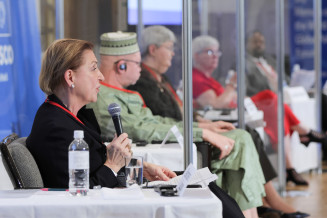News
UNESCO strengthens global partnerships for the safeguarding of documentary heritage at risk

The Memory of the World (MoW) Programme marks its 30th anniversary this year. In his opening speech, Tawfik Jelassi, UNESCO’s Assistant Director-General of the Communications and Information Sector commented on this significant milestone.
The event, which had 70 participants onsite, also had over 700 registered online participants from various fields of documentary heritage.
The experts shared their past efforts, highlighting best practices for effective policy development and capacity building against disasters. The exchanges that arose during the discussion allowed, among other things, to identify similarities in the challenges that exist across regional contexts.
The need to build solid networks as a disaster risk reduction strategy, particularly in the Caribbean region, has led to the formation of the MOWLAC observatory, which aims to connect the region in an alert system that would warn memory institutions of potential threats brought about by natural disasters.
Experts also discussed existing initiatives to protect documentary heritage at risk in the event of human-made disasters, conflict, war or climate change, highlighting the complexities that arise during rescuing and safeguarding efforts in emergency situations. Local memory institutions have partnered with international non-governmental organizations as a way to protect the histories, memories, and identities of local communities whose documentary heritage has been affected by disasters. This is a big part of the initiatives set up at the professional-associational level.
The third edition of the Global Policy Forum was organized as part of a newly launched three-year project funded by Japan, with a focus on Least Developed Countries and Small Island Developing States in Africa, Asia, Latin America and the Caribbean. Representation of these regions accounted for more than 70% of the online and in-person participation during the event.
As part of this Japan’s support, a global initiative, to safeguard documentary heritage at risk was announced during the event. It will entail providing financial assistance to memory institutions whose documentary heritage is demonstrably at risk.
This initiative will contribute greatly to the Memory of the World Programme's mission of raising awareness of, protecting, and ensuring universal and permanent access to the world's documentary heritage.










